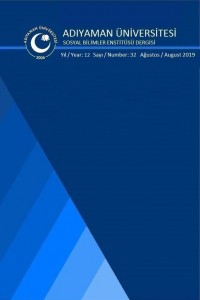Abstract
One
of the most fundamental features of the Islamic thought that has göne through
its Golden Age between VIII- XIII centuries is that it has a dynamic
apologethic-philosophical debate that is ongoing simultaneously or on a
continuous basis. These discussions, which are called "Tradition of
Criticism", are undoubtedly the debate which started with the work of
Tehâfütü'l-Felâsife (Inconsistency of Philosophers), which is the first and the
most famous, in which Ghazzali has written to criticize philosophers, especially
Avicenna. Al-Ghazzali claimed that philosophers committed big sin in three
matters: Receiving the eternity of world with God, God will not know partials
and realization of the resurrection in the life after death without body. In
this study, we will examine and compare the views of the eternity of the
universe with the views of Avicenna, Gazzali and Hojazadhe.
References
- el-Akkâd, A. M. (1946). Eş-Şeyh Er-Reîs İbn Sînâ. Kahire: Dârü'l-Maârif.
- el-İci, A. A. (1997). El-Mevâkıf. Beyrut: Darü'l-Cîl.
- el-İsfahani, R. (2016). Müfredât Kur'ân Kavramları Sözlüğü. İstanbul: Pınar Yayınları.
- el-Lekkânî, İ. (1955). En-Nizâmü’l-Ferîd Bi-Tahkıki Cevhereti’t-Tevhîd. Kahire.
- en-Nesefî, E. M. (1993). Tebsıratü’l-Edille Fî Usûli’d-Dîn. Çev., Hüseyin Atay, Şaban Ali Düzgün. Ankara: Diyanet İşleri Başkanlığı Yayınları.
- eş-Şehristânî, M. (1984). El-Milel ve'n-Nihâl. Beyrut: Dâr’ül-Mârife.
- eş-Şehristânî, M. (1990). Milel ve Nihal. Çev., Mehmet Dalkılıç. İstanbul: Litera Yayıncılık.
- Fahri, M. (2000). İslam Felsefesi Tarihi. İstanbul: Birleşik Yayıncılık.
- Gazzâlî. (2004). El-İktisad Fi’l İtikad. Beyrut: Dâr’ül-Kütüb el-İlmiye.
- Gazzâlî. (2011). Tehâfütü-l Felâsife. Kahire: Dâr’üt-Telâih.
- Hocazâde, M. M. (2018). Et-Tehâfüt Fi’l-Muhâkeme Beyne’l Gazzâlî ve’l Felâsife. Thk., Luay Hatem Yaqoob. Beyrut: Er-Risale el-Alemiyye.
- Işık, K. (1967). Mu'tezilenin Doğuşu ve Kelami Görüşleri. Ankara: Ankara Üniversitesi Basımevi.
- İbn Sînâ. (2008). Kitâbü’t-Ta’lîkât,. Dimaşk: Telvîn.
- İbn Sînâ. (2013a). Metafizik II. İstanbul: Litera Yayıncılık.
- İbn Sînâ. (2013b). Kitabû’l-Hudûd. Ankara: Elis Yayınları.
- Kutluer, İ. (2013). İbn Sînâ Ontolojisinde Zorunlu Varlık. İstanbul: İz Yayıncılık.
- Özdemir, M. (2012). Gazzâlî'nin Tehâfütü'l-Felâsife Adlı Eserinde "Üç Mesele"nin Ele Alınışı. Yayınlanmamış doktora tezi, Marmara Üniversitesi Sosyal Bilimler Enstitüsü, İstanbul.
- Teymiyye, A. B. (2000). Es-Sefdiye. Thk., Muhammed Reşad. Mısır: Dâr’ül Hudâ.
- Topaloğlu, B. (1998). Hudûs. Türkiye Diyanet Vakfı İslam Ansiklopedisi (305). İstanbul: Türkiye Diyanet Vakfı Yayınları.
- Tûsi, A. A. (1990). Tehâfütü'l-Felâsife. Ankara: Kültür Bakanlığı Yayınları.
- Yavuz, Y. Ş. (2002). Kıdem. Türkiye Diyanet Vakfı İslam Ansiklopedisi (395). Ankara: Türkiye Diyanet Vakfı Yayınları.
- Yıldırım, Ö. A. (2012). “İslam Düşüncesindeki Yoktan Yaratma Ve Kıdem Tartışmaları: Kelâmcılar Ve İbn Sînâ Merkezli Bir İnceleme.” Kelam Araştırmaları, 10 (2):251-274.
Abstract
Altın çağını VIII-XIII. Yüzyıllar
arasında yaşamış olan İslam düşüncesinin en temel özelliklerinden biri,
eşzamanlı ya da artzamanlı olarak süregelen, dinamik kelâm-felsefe
tartışmalarına sahip olmasıdır. “Tehâfüt geleneği” biçiminde adlandırılan bu
tartışmaların hiç şüphesiz ilki ve en meşhuru, Gazzâlî’nin, başta İbn Sinâ
olmak üzere filozofları eleştirmek için kaleme aldığı ““Tehâfütü’l-Felâsife (Filozofların
Tutarsızlığı) adlı eseriyle başlayan tartışmadır. Gazzâlî, şu üç meselede
filozofların küfre girdiğini iddia etmiştir: Allah ile beraber âlemin kadîm
sayılması, Allah’ın tikelleri bilemeyeceği ve ölümden sonraki hayatta bedensiz
dirilişin gerçekleşmesi. Biz bu çalışmamızda âlemin kıdemi meselesini İbn Sina,
Gazzâlî ve Hocazâdenin görüşlerini karşılaştırmak suretiyle ele alıp
inceleyeceğiz.
Keywords
References
- el-Akkâd, A. M. (1946). Eş-Şeyh Er-Reîs İbn Sînâ. Kahire: Dârü'l-Maârif.
- el-İci, A. A. (1997). El-Mevâkıf. Beyrut: Darü'l-Cîl.
- el-İsfahani, R. (2016). Müfredât Kur'ân Kavramları Sözlüğü. İstanbul: Pınar Yayınları.
- el-Lekkânî, İ. (1955). En-Nizâmü’l-Ferîd Bi-Tahkıki Cevhereti’t-Tevhîd. Kahire.
- en-Nesefî, E. M. (1993). Tebsıratü’l-Edille Fî Usûli’d-Dîn. Çev., Hüseyin Atay, Şaban Ali Düzgün. Ankara: Diyanet İşleri Başkanlığı Yayınları.
- eş-Şehristânî, M. (1984). El-Milel ve'n-Nihâl. Beyrut: Dâr’ül-Mârife.
- eş-Şehristânî, M. (1990). Milel ve Nihal. Çev., Mehmet Dalkılıç. İstanbul: Litera Yayıncılık.
- Fahri, M. (2000). İslam Felsefesi Tarihi. İstanbul: Birleşik Yayıncılık.
- Gazzâlî. (2004). El-İktisad Fi’l İtikad. Beyrut: Dâr’ül-Kütüb el-İlmiye.
- Gazzâlî. (2011). Tehâfütü-l Felâsife. Kahire: Dâr’üt-Telâih.
- Hocazâde, M. M. (2018). Et-Tehâfüt Fi’l-Muhâkeme Beyne’l Gazzâlî ve’l Felâsife. Thk., Luay Hatem Yaqoob. Beyrut: Er-Risale el-Alemiyye.
- Işık, K. (1967). Mu'tezilenin Doğuşu ve Kelami Görüşleri. Ankara: Ankara Üniversitesi Basımevi.
- İbn Sînâ. (2008). Kitâbü’t-Ta’lîkât,. Dimaşk: Telvîn.
- İbn Sînâ. (2013a). Metafizik II. İstanbul: Litera Yayıncılık.
- İbn Sînâ. (2013b). Kitabû’l-Hudûd. Ankara: Elis Yayınları.
- Kutluer, İ. (2013). İbn Sînâ Ontolojisinde Zorunlu Varlık. İstanbul: İz Yayıncılık.
- Özdemir, M. (2012). Gazzâlî'nin Tehâfütü'l-Felâsife Adlı Eserinde "Üç Mesele"nin Ele Alınışı. Yayınlanmamış doktora tezi, Marmara Üniversitesi Sosyal Bilimler Enstitüsü, İstanbul.
- Teymiyye, A. B. (2000). Es-Sefdiye. Thk., Muhammed Reşad. Mısır: Dâr’ül Hudâ.
- Topaloğlu, B. (1998). Hudûs. Türkiye Diyanet Vakfı İslam Ansiklopedisi (305). İstanbul: Türkiye Diyanet Vakfı Yayınları.
- Tûsi, A. A. (1990). Tehâfütü'l-Felâsife. Ankara: Kültür Bakanlığı Yayınları.
- Yavuz, Y. Ş. (2002). Kıdem. Türkiye Diyanet Vakfı İslam Ansiklopedisi (395). Ankara: Türkiye Diyanet Vakfı Yayınları.
- Yıldırım, Ö. A. (2012). “İslam Düşüncesindeki Yoktan Yaratma Ve Kıdem Tartışmaları: Kelâmcılar Ve İbn Sînâ Merkezli Bir İnceleme.” Kelam Araştırmaları, 10 (2):251-274.
Details
| Primary Language | Turkish |
|---|---|
| Journal Section | Articles |
| Authors | |
| Publication Date | August 30, 2019 |
| Published in Issue | Year 2019 Issue: 32 |

